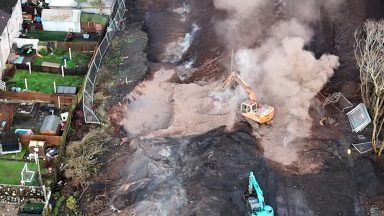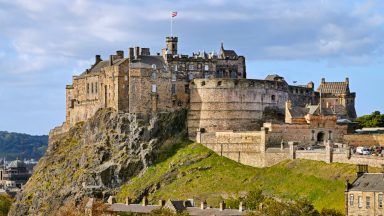In the Spring of 1944, when two million Allied troops were amassing in southern England ahead of the D-Day invasion, King Charles’ grandfather was on a different mission.
King George VI was among the few who knew the historic Allied invasion of Normandy was being planned.
But he was dispatched by then-Prime Minister Winston Churchill to parts of the UK which were not hosting the troops who would soon be storming the beaches of northern France.
King George’s mission? To fool Adolf Hitler.

In other words, the British Monarch was deployed as a high-profile decoy.
The codename for his mission, Operation Fortitude, is much less famous than Operation Overload – which was the name given to the Allied invasion of Normandy – but King George was the frontman of it.
German high command was expecting an invasion of the continent.
But they didn’t know which part of Nazi-occupied Europe would be attacked.
So the King was sent off on a high-profile visit to south-east England. Reporters shared the news of his visit and photographers captured the moment.
It helped to convince Hitler and his generals that the Allied attack would be coming from the Kent coast and the invading troops would land along the French coast around Calais.
But this was a two-pronged royal mission of deception.
Because King George was also sent north to Scotland. From where the Nazi regime suspected an attack on the Norwegian coast might come.
Some months before, British intelligence officers had convinced King George’s private secretary that the Monarch was the person they needed to assist with the elaborate cover-up.
A pretend oil storage complex near Dover was one of the sites the King visited.

Alongside inflatable tanks, fake radio traffic and dummy landing craft, it was part of the deception.
And, in the waters of Scapa Flow, the Royal Navy fleet was given a royal inspection by George VI over three days in May – a month before D-Day. The Daily Mail reported on May 15, 1944 that King George had “taken leave” of his fleet “before battle”.
As we know, neither the Norway or the Calais attack was true.
But by ordering German fighting divisions to keep defending different parts of the Atlantic Wall – the Nazi’s coastal defences which stretched from northern Spain to the Norwegian coast – Fortitude was one of the ingredients which led to the success of the D-Day landings when they could have easily ended in failure.

The Allied plan all along was to send forces across the more risky stretch of the English Channel from the coasts of Hampshire and Dorset to land on a 50-mile stretch of Normandy beaches.
Even after the Normandy landing, the Nazis still thought an attack on the Pas de Calais region was imminent, such was the success of Operation Fortitude.
They remained convinced that the Normandy invasion was just a diversionary tactic and that the coast at Calais still needed to be heavily defended.
In war, information or misinformation is a powerful weapon and King George was happy to assist in any way he could.
Follow STV News on WhatsApp
Scan the QR code on your mobile device for all the latest news from around the country




























